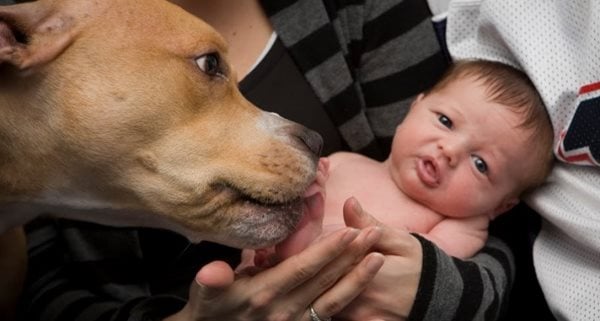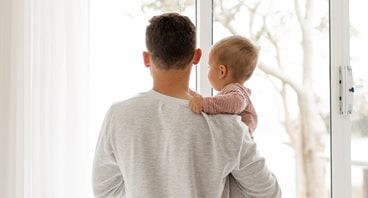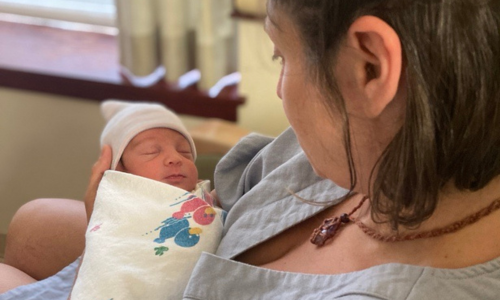How to Prepare a Family Dog for a Baby

Many people refer to their dogs as their “first baby.” But what happens when a human baby joins the family? How can parents help their dog adjust to the new baby?
The answers lie in preparing your pup in stages for your baby’s arrival. Here are some tips from Emerson’s maternity team to help your furry family member adjust to your baby’s arrival. With some planning and patience, your baby and dog might soon become best friends!
When you learn you are expecting
- Sign your dog up for an obedience class now so he learns not to jump onto a person whenever they walk in the door or get spooked by unpredictable behavior, like a baby throwing food or toys. A professional training class can help your dog get used to many situations, such as unexpected movements, loud noises like a baby crying, and visitors coming in and out of the home.
- If your dog has aggressive or other concerning behaviors, focus on correcting them now. A professional trainer may be needed.
- Take your dog to places with lots of young families, such as parks and playgrounds.
- Get your dog comfortable behind a barrier—crates and/or gates. This is especially helpful for dogs with separation issues. It will give you peace of mind once the baby arrives, and you can’t always have eyes on both your dog and baby at the same time.
- Teach your dog to lie on command on a mat or dog bed. For a dog that loves to be by your side, you will appreciate that your pup can respond quickly and dependably to your request to lie down, especially when you are sitting down to feed your baby.
A few months before your baby arrives
- Begin to prepare your pup for his future human friend. Some families walk around the house with a doll and pretend it is the infant. This can help your dog get used to things like a bassinet, baby swing, bath seat, stroller, etc.
- Introduce your dog to new smells, such as baby soap and laundry detergent.
- If your dog is used to sitting on your lap, refrain from doing that; your pup will probably get less lap time when the baby comes!
- Arrange care for your precious pup while you are at the hospital. Make sure you have a few people lined up if someone is unavailable when you need to get to the hospital.
- While you are planning for your dog’s well-being when your baby arrives, you might also consider arranging for regular daycare for your dog, especially for the first few weeks that you are home with a new baby. This will help you give full attention to the baby.
- Walking is great for expectant parents. Take your dog with you on walks and practice what it will be like to take your baby for a walk in a stroller or carrier while your dog is on a leash. Safety tip: Never loop the leash onto a stroller handle; this could result in a dangerous accident if the dog suddenly moves or runs. If you have a friend or relative with a dog and a baby, ask them if you can bring your dog to visit or go for a walk together so your dog gets used to life with a real baby.
A month or several weeks before you are due
- Ask the person caring for your dog while you have your baby to be home when you return from the hospital. An extra set of hands to keep your dog calm and on a leash is helpful as you come home to an excited pup.
- Keep new baby gear out so your pup can get used to it being there.
- Consider installing baby gates to keep your dog from areas where the baby might spend a lot of time, such as where you plan to feed your baby and the bassinette or crib.
- Ensure your dog is well groomed, its nails are short, and it is up-to-date on vaccinations to help prevent the baby from getting germs and scratches.
- If your dog is due for a vet appointment or check-up, get it done now. You will have less time for these appointments when your baby arrives.
- If you have any questions about dogs and babies, contact your pediatrician and/or veterinarian. They are a wonderful source of wisdom, and many of them have direct experience raising a dog and a baby!
When you come home with your new baby
- Have a plan and stick with it. Your dog will likely be very excited to see you and confused by the new human in the family. Consider having someone else focus on the dog and give it extra attention while you hold the baby, especially when you first enter your home from the hospital.
- Ensure your pup gets exercise just before your homecoming so that he is not as energetic.
- When you return home, the pup should be on a leash with a trusted adult.
- Have mom come into the house first while baby stays in the car with another adult. This way, mom can get into the house safely without being jostled by the excited pup.
- Parents should each take a moment to greet the pup.
- Carry your baby into the house in their infant car seat. This provides additional protection from an excited/jumpy pup. When you are inside with your baby, the seat should be placed on a secure, elevated surface within arm’s reach of an adult.
- Introduce your pup to the baby when the pup is calm and on a leash while the baby is still in the car seat. Have an adult walk the dog past the car seat while securely holding the leash. Allow the dog to sniff the baby’s feet for several seconds, and then move away. Reward your pup with plenty of treats for moving away. (Not for sniffing!)
- Don’t focus on getting the Instagram-approved photo with the baby and dog. They will have plenty of time to get to know each other — there is no need to rush the bond!
The first several weeks home together
- Have healthy dog treats that are easily accessible so they are handy to give your pup while you feed the baby and to reward the pup’s good behavior. Sliced apples and carrots can make good dog treats. (We won’t say anything if you nibble on some to nourish yourself, too!)
- Make sure your pup gets lots of exercise. This will help tire him out, make him less anxious, and less prone to puppy mischief that you will no longer have as much time to deal with.
- Spend some one-on-one time each day with your pup. It will help your dog know he is still a beloved part of the family and help relax you during the hectic time of raising a newborn. Dogs are also known to help reduce high blood pressure and depression, which is important for overall good human health.
Above all
- Never leave your dog unattended with the baby. Even calm and gentle dogs can react in unpredictable and sometimes aggressive ways to a new family member.
- Make sure your dog knows that the baby is the alpha. You can do this by giving your dog commands such as “sit, down, and stay” while you focus on the baby.


